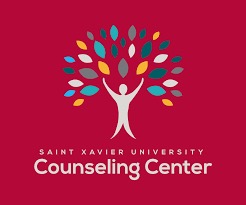Description: The Counseling Center’s logo Source: sxu.edu
It is the time of year when Seasonal Affective Disorder (SAD) is in full swing. As a result, motivation in regards to both academics and personal events is taking a sizable hit.
SAD commonly has symptoms such as: increased sleep and daytime drowsiness, loss of interest and pleasure in activities formerly enjoyed, social withdrawal and increased sensitivity to rejection, irritability and anxiety, feelings of guilt and hopelessness, fatigue/low energy level, decreased ability to focus or concentrate, trouble thinking clearly, increased appetite (especially for sweets and carbohydrates), weight gain, and physical problems, such as headaches.
While seasonal depression is not affecting the entire Editorial Board, members that are feeling the impact have noticed that they have trouble starting even the simplest of assignments.
“I don’t know if it’s in response to my workload or the general atmosphere on campus, but I’m much less likely to stay on top of my work. Many of my friends think it’s just senioritis, but I think there are a lot more moving parts at play,” stated a member of the Editorial Board.
On the other hand, some members of the board noted that they feel more motivated than ever. They attributed this increased motivation to where they are in regards to finishing their time in college, either being in the final stretch and preparing to graduate this May or finishing up their first year.
Most members of the Editorial Board have seen this decrease in motivation have an impact on their peers, regardless of their major. One member used group work as an example in regards to where they see this motivational decline, stating that it has “always been like pulling teeth. This year specifically, it’s been hard trying to engage with 90% of my peers. Class discussions are usually held between two or three out of twenty students.”
Still, some members are not noticing this decrease, stating that “I think we’re all very tired, but everyone is still getting their work done. There’s nothing out of the ordinary to see.”
According to the American Psychiatric Association (APA), about 5% of adults in the United States experience SAD. “SAD is more than just ‘winter blues.’ The symptoms can be distressing and overwhelming and can interfere with daily functioning” writes the APA website.
25% of college-aged students across the United States experience SAD according to Appalachian State University; the university attributes this increase to the days becoming shorter and the lesser amount of sunlight, which causes a decrease in serotonin levels.
“In addition, many environmental stressors related to the winter holidays can increase feelings of sadness and stress. Some common stressors during the holidays include family conflict, financial strain, missing loved ones, and travel,” voices the university.
Students across the nation, not just at Saint Xavier, are experiencing the effects of SAD.
“The U.S. education system, specifically at the postsecondary level, is no longer effective. Students are bombarded with work and the expectation is memorization, not retention of information,” expressed a member of the Editorial Board.
There is no cure-all for SAD, but that being said, it is beyond helpful to simply be kind to those who are experiencing these symptoms. “I think everyone needs to be a little more empathetic. There are a million stressors only making the problem worse,” emphasized a member of the Editorial Board.
It is nearly impossible to not feel the effects of life as it is, given the factors in one’s personal life and the events occurring on a global scale.
Some variation of the phrase “be kind, for everyone you meet is fighting a battle you know nothing about”, is not some new and profound bit of information to most. Rather, it is a notion that was drilled into the minds of many growing up and is relevant now more than ever.
Members of the Editorial Board suggested that de-stressing events, mindfulness, and leniency in regards to school work may be beneficial to helping students manage the effects of SAD. However, it was pointed out by a member of the board that “having a couple more days off from school could be a possible solution but students would still end up using that day to work more hours or work on assignments. College students don’t have the luxury of rest.”
Another member highlighted the education system as a whole, stating that “it needs to be completely rehabbed. Until then, individual colleges need to take initiative in making their institutions better for the students.”
SAD is more than just the “winter blues” and should be treated as such. It is a serious form of depression that has an impact on many, and can be worsened by environmental factors such as stress, something that college students are more than familiar with.
It is okay to ask for help. Help is available, and it is worth making time to seek out the resources that can provide it. Saint Xavier has a Counseling Center and a Center for Learning and Student Support, both of which are free for students.
The Counseling Center has a “Request for Services” form for students to fill out in order to receive support for the side effects of SAD and the Center for Learning and Student Support has appointments available to be scheduled for students to receive support in regards to their academics.
Aside from these resources, one can also: eat healthy and well balanced meals, get regular exercise, set a healthy sleep schedule, or increase their exposure to sunlight in order to relieve their symptoms.

